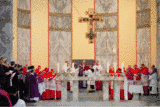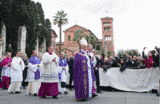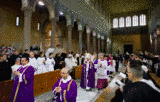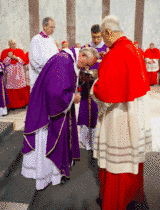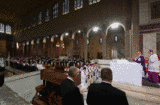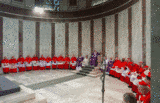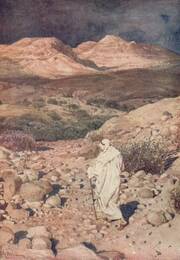Lent 2014
Pope Francis's Message 
(cf 2 Cor 8, 9) - in Albanian, Arabic, Chinese (China), Chinese (Taiwan), English, French, German, Italian, Polish, Portuguese & Spanish
He became poor, so as to enrich us with his poverty
Dear Brothers and Sisters,
For the occasion of Lent, I offer you some reflections, that they may be of help on the personal and communal path of conversion. I take my cue from Saint Paul's expression: “For you know the grace of our Lord Jesus Christ, though he was rich, he became poor for you, so that you might become rich by his poverty” (2 Cor 8:9). The Apostle addressed the Christians of Corinth to encourage them to be generous in helping the faithful in Jerusalem who were in need. What do these words of Saint Paul say to us, the Christians of today? What does the invitation to poverty, to a life poor in the evangelical sense, say to us today?
The grace of Christ
First of all, they tell us what God's style is. He does not reveal Himself with the means of the power and the riches of the world, but with those of weakness and poverty: “though He was rich, he became poor for you…”. Christ, the eternal Son of God, equal in power and glory with the Father, made himself poor; He descended among us, He made himself close to each of us; He stripped himself, "emptied himself", so as to render himself like us in all things (cf Phil 2:7; Heb 4:15). God's incarnation is a great mystery! But the reason for all this is divine love, a love which is grace, generosity, the desire to be close, and which does not hesitate to give itself and sacrifice itself for the beloved creatures. Charity, love is to share in everything the fate of the beloved. Love renders similar, creates equality, breaks down walls and distances. And God has done this with us. Indeed, Jesus “worked with the hands of a man, thought with the intelligence of a man, acted with the will of a man, loved with the heart of a man. Born of the Virgin Mary, he truly was made one of us, like us in all things except sin.” (Gaudium et Spes, 22).
The purpose of Jesus making himself poor is not poverty for its own sake but - St Paul says - “so that you might become rich by his poverty”. This is not a play on words, not an expression for effect. It is, instead, a summary of the logic of God, the logic of love, the logic of the Incarnation and of the Cross. God did not make salvation fall on us from above, like the alms of one who gives some of their surplus with philanthropic piety. This is not the love of Christ! When Jesus descended into the waters of the Jordan and was baptized by John the Baptist, He did not do this because he needed repentance, conversion; He did it to put himself in the midst of the people in need of forgiveness, in the midst of us sinners, and He bore upon himself the weight of our sins. This is the way that He has chosen to console us, to save us, to free us from our misery. It strikes us that the Apostle says that we have been set free, not by means of the riches of Christ, but by means of his poverty. And yet St Paul knows well the “unfathomable riches of Christ” (Eph 3, 8), “heir of all things” (Heb 1, 2).
So what is this poverty with which Jesus frees us and renders us rich? It is exactly his way of loving us, his getting close to us like the Good Samaritan who drew near to the man left half dead on the side of the road (cf Lk 10, 25ff). That which gives us true freedom, true salvation and true happiness is his love of compassion, tenderness and sharing. The poverty of Christ which enriches us is his taking flesh, his taking upon himself our weaknesses, our sins, communicating to us the infinite mercy of God. The poverty of Christ is the greatest of riches: Jesus is rich in his boundless trust in God the Father, in his giving himself to Him in every moment, seeking always and only the will and the glory of God the Father. Jesus is rich as a child is who feels loved and loves his parents and does not for an instant doubt their love and tenderness. The richness of Jesus is his being the Son, his unique relationship with the Father is the sovereign prerogative of this poor Messiah. When Jesus invites us to take upon ourselves his “easy yoke”, he invites us to be enriched by this his “rich poverty” and “poor richness”, to share with Him his filial and fraternal Spirit, to become sons and daughters in the Son, brothers and sisters in the Firstborn Brother (cf Rom 8:29).
It has been said that the only true sadness is in not being saints (L. Bloy); we could also say that there is only one true misery: not living as children of God and as brothers and sisters of Christ.
Our witness
We might think that this “way” of poverty was that of Jesus, while we, who come after Him, can save the world with adequate human means. This is not so. In every age and in every place, God continues to save men and the world through the poverty of Christ, who makes himself poor in the Sacraments, in the Word and in his Church, which is a people of the poor. The riches of God pass not through our riches, but always and only through our poverty, personal and communal, animated by the Spirit of Christ.
In imitation of our Master, we Christians are called to look at the misery of our brothers and sisters, to touch it, to take it upon ourselves and to work concretely to alleviate it. Misery does not coincide with poverty: misery is poverty without trust, without solidarity, without hope. We can distinguish three types of misery: material misery, moral misery and spiritual misery. Material misery is what is commonly called poverty and touches all those who live in conditions not worthy of the human person: deprived of fundamental rights and of basic necessities such as food, water, hygienic conditions, work, the possibility of development and cultural growth. Facing this misery, the Church offers her service, her diakonia, so as to meet these needs and heal these wounds that disfigure the face of humanity. In the poor and in the last we see the face of Christ; by loving and helping the poor, we love and serve Christ. Our commitment is directed also to make sure that violations of human dignity, discrimination and abuse in the world cease, which are, in many cases, at the origin of misery. When power, luxury and money become idols, they take precedence over the demand for an equitable distribution of wealth. Therefore, it is necessary for consciences to be converted to justice, equality, restraint and sharing.
No less troubling is moral misery, which consists in becoming slaves to vice and sin. How many families are in anguish because one of their members – often young - is subjugated to alcohol, drugs, gambling, pornography! How many people have lost the meaning of life, are deprived of prospects for the future and have lost hope! And how many people are forced into this misery by unjust social conditions, by lack of work that deprives them of the dignity of bringing bread home, through the lack of equality with respect to the rights of education and health care. In these cases moral misery may well be called incipient suicide. This form of misery, which is also the cause of economic ruin, is always linked to spiritual misery, which strikes us when we turn away from God and refuse his love. If we consider we don’t need God, who in Christ holds out his hand to us, because we think we can make it on our own, we are setting off on a way of failure. God is the only one who truly saves and liberates.
The Gospel is the true antidote to spiritual misery: the Christian is called to bring to every environment the liberating announcement that there exists forgiveness for evil committed, that God is greater than our sin and He loves us gratuitously/freely, always, and that we were made for communion and for eternal life. The Lord invites us to be joyful heralds of this message of mercy and hope! It is beautiful to experience the joy of spreading this good news, to share the treasure entrusted to us, to console the brokenhearted and to give hope to so many brothers and sisters enveloped by darkness. It means following and imitating Jesus, who went to the poor and the sinners as a shepherd to the lost sheep, and he went there full of love. United to Him, we can courageously open up new avenues of evangelization and human promotion.
Dear brothers and sisters, may this time of Lent find the whole Church ready and called to witness to all those who live in material, moral and spiritual misery the Gospel message, which is summed up in the announcement of the love of the merciful Father, who is ready to embrace each person in Christ. We can do this in the measure to which we are conformed to Christ, who made himself poor and enriched us with his poverty. Lent is a suitable time for stripping oneself; and we will do well to ask ourselves of what things we can deprive ourselves in order to help and enrich others with our poverty. Let us not forget that true poverty hurts: it would not be a valid stripping/self-denial without this penitential dimension. I distrust almsgiving that does not cost and that does not hurt.
May the Holy Spirit, thanks to whom we are “as poor people, but capable of enriching many; as people who have nothing and yet we possess everything” (2 Cor 6, 10), sustain these our resolutions and strengthen in us our attention and responsibility for human misery, so as to become merciful and workers of mercy. With this hope, I assure you of my prayers that every believer and every ecclesial community will tread a fruitful Lenten journey, and I ask you to pray for me. May the Lord bless you and Our Lady watch over you.
From the Vatican, 26 December 2013, Feast of Saint Stephen, Deacon and First Martyr
FRANCIS
Papa Francis' Homily at Mass on Ash Wednesday
at the Basilica of St Sabina on the Aventine Hill
5 March 2014 - in English, French, German, Italian, Portuguese & Spanish
"“Rend your hearts and not your garments” (Joel 2, 13).
"With these penetrating words of the Prophet Joel, the liturgy today introduces us into Lent, pointing to conversion of heart as the chief characteristic of this season of grace. The prophetic appeal challenges all of us without exception, and it reminds us that conversion is not to be reduced to outward forms or to vague intentions, but engages and transforms one’s entire existence beginning from the centre of the person, from the conscience. We are invited to embark upon a journey on which, by defying routine, we strive to open our eyes and ears, but especially to open our hearts, in order to go beyond our own “backyard”.
Opening oneself to God and to the brethren. We know that this increasingly artificial world would have us live in a culture of “doing”, of the “useful”, where we exclude God from our horizon without realizing it. But we also exclude the horizon itself! Lent beacons us to “rouse ourselves”, to remind ourselves that we are creatures, simply put, that we are not God. In the little daily scene, as I look at some of the power struggles to occupy spaces, I think: these people are playing God the Creator. They still have not realized that they are not God.
And we also risk closing ourselves off to others and forgetting them. But only when the difficulties and suffering of others confront and question us may we begin our journey of conversion towards Easter. It is an itinerary which involves the Cross and self-denial. Today’s Gospel indicates the elements of this spiritual journey: prayer, fasting and almsgiving (cf. Mt 6:1-6; 16-18). All three exclude the need for appearances: what counts is not appearances; the value of life does not depend on the approval of others or on success, but on what we have inside us.
The first element is prayer. Prayer is the strength of the Christian and of every person who believes. In the weakness and frailty of our lives, we can turn to God with the confidence of children and enter into communion with him. In the face of so many wounds that hurt us and could harden our hearts, we are called to dive into the sea of prayer, which is the sea of God’s boundless love, to taste his tenderness. Lent is a time of prayer, of more intense prayer, more prolonged, more assiduous, more able to take on the needs of the brethren; intercessory prayer, to intercede before God for the many situations of poverty and suffering.
The second key element of the Lenten journey is fasting. We must be careful not to practice a formal fast, or one which in truth “satisfies” us because it makes us feel good about ourselves. Fasting makes sense if it questions our security, and if it also leads to some benefit for others, if it helps us to cultivate the style of the Good Samaritan, who bends down to his brother in need and takes care of him. Fasting involves choosing a sober lifestyle; a way of life that does not waste, a way of life that does not “throw away”. Fasting helps us to attune our hearts to the essential and to sharing. It is a sign of awareness and responsibility in the face of injustice, abuse, especially to the poor and the little ones, and it is a sign of the trust we place in God and in his providence.
The third element is almsgiving: it points to giving freely, for in almsgiving one gives something to someone from whom one does not expect to receive anything in return. Gratuitousness should be one of the characteristics of the Christian, who aware of having received everything from God gratuitously, that is, without any merit of his own, learns to give to others freely. Today gratuitousness is often not part of daily life where everything is bought and sold. Everything is calculated and measured. Almsgiving helps us to experience giving freely, which leads to freedom from the obsession of possessing, from the fear of losing what we have, from the sadness of one who does not wish to share his wealth with others.
With its invitations to conversion, Lent comes providentially to awaken us, to rouse us from torpor, from the risk of moving forward by inertia. The exhortation which the Lord addresses to us through the prophet Joel is strong and clear: “Return to me with all your heart” (Jl 2:12). Why must we return to God? Because something is not right in us, not right in society, in the Church and we need to change, to give it a new direction. And this is called needing to convert! Once again Lent comes to make its prophetic appeal, to remind us that it is possible to create something new within ourselves and around us, simply because God is faithful, always faithful, for he cannot deny himself, he continues to be rich in goodness and mercy, and he is always ready to forgive and start afresh. With this filial confidence, let us set out on the journey!"
Catechesis by Papa Francesco
Wednesday General Audience, 5 March 2014
- in Arabic, Croatian, English, French, German, Italian, Portuguese & Spanish
"Dear Brothers and Sisters, Good morning,
Today, Ash Wednesday, marks the beginning of the Lenten journey of 40 days, which will lead us to the Easter Triduum, the memorial of the Lord’s passion, death and resurrection and the heart of the mystery of our salvation. Lent prepares us for this most important moment; therefore, it is a “powerful” season, a turning point that can foster change and conversion in each of us. We all need to improve, to change for the better. Lent helps us and thus we leave behind old habits and the lazy addiction to the evil that deceives and ensnares us. During the season of Lent, the Church issues two important invitations: to have a greater awareness of the redemptive work of Christ; and to live out one’s Baptism with deeper commitment.
Awareness of the marvels that the Lord has wrought for our salvation disposes our minds and hearts to an attitude of thanksgiving to God for all that he has given us, for all that he has accomplished for the good of his People and for the whole of humanity. This marks the beginning of our conversion: it is the grateful response to the stupendous mystery of God’s love. When we see the love that God has for us, we feel the desire to draw close to him: this is conversion.
Living our Baptism to the full — the second invitation — also means not accustoming ourselves to the situations of degradation and misery that we encounter as we walk along the streets of our cities and towns. There is a risk of passively accepting certain forms of behaviour and of not being shocked by the sad reality surrounding us. We become accustomed to violence, as though it were a predictable part of the daily news. We become accustomed to brothers and sisters sleeping on the streets, who have no roof to shelter them. We become accustomed to refugees seeking freedom and dignity, who are not received as they ought to be. We become accustomed to living in a society which thinks it can do without God, in which parents no longer teach their children to pray or to make the sign of the Cross. I ask you: do your children, do your little ones know how to make the sign of the Cross? Think about it. Do your grandchildren know how to make the sign of the Cross? Have you taught them? Think about it and respond in your heart. Do they know how to pray the “Our Father”? Do they know how to pray to Our Lady with the “Hail Mary”? Think about it and respond within yourselves. Growing accustomed to un-Christian and convenient behaviour narcotises the heart!
Lent comes to us as a providential time to change course, to recover the ability to react to the reality of evil which always challenges us. Lent is to be lived as a time of conversion, as a time of renewal for individuals and communities, by drawing close to God and by trustfully adhering to the Gospel. In this way, it also allows us to look with new eyes at our brothers and sisters and their needs. That is why Lent is a favourable time to convert to the love of God and neighbour; a love that knows how to make its own the Lord’s attitude of gratuitousness and mercy — who “became poor, so that by his poverty you might become rich” (cf. 2 Cor 8:9). In meditating on the central mysteries of the Faith, the Passion, Cross and Resurrection of Christ, we shall realize that the immeasurable gift of the Redemption has been granted to us through God’s free initiative.
Let us give thanks to God for the mystery of his crucified love; authentic faith, conversion and openness of heart to the brethren: these are the essential elements for living the season of Lent. On this journey, we want to invoke with special trust the protection and help of the Virgin Mary: may she, who was the first to believe in Christ, accompany us in our days of intense prayer and penance, so that we might come to celebrate, purified and renewed in spirit, the great Paschal mystery of her Son."
Greetings:
"Chers amis de langue française, je suis heureux de vous accueillir ce matin. Je salue particulièrement les membres de la faculté de théologie d’Angers, les paroisses et les nombreux groupes de jeunes venus de France et de Suisse. Que la Vierge Marie vous accompagne en ces jours de prière intense et de pénitence qui nous préparent à célébrer le grand mystère de la Pâque de son Fils ! Bon carême à tous!
I greet all the English-speaking pilgrims present at today’s Audience, including those from Malta, Denmark, Sweden, Indonesia, Canada and the United States. May the Lenten journey we begin today bring us to Easter with hearts purified and renewed by the grace of the Holy Spirit. Upon you and your families I invoke joy and peace in Christ our Redeemer!
Ein herzliches Willkommen an alle Gäste aus Deutschland, Österreich, aus der Schweiz und aus Südtirol! Besonders begrüße ich die jungen Menschen, die Schülergruppen und die Studierenden, die heute unter uns sind. Euch allen wünsche ich eine erfüllte und gnadenreiche Fastenzeit und einen schönen Aufenthalt hier in Rom. Gott segne euch!
Saludo a los peregrinos de lengua española, en particular a los grupos provenientes de España, México, Argentina y otros países latinoamericanos. En este tiempo de Cuaresma, invito a todos a invocar con confianza la ayuda de la Virgen María, para que nos acompañe en estos días de oración y de penitencia, para llegar a celebrar, renovados en el espíritu, el gran misterio de la Pascua de su Hijo. Muchas gracias.
Com ânimo feliz e agradecido, saúdo o grupo vindo de Riberão e Guimarães e também os professores e os alunos das comunidades escolares de Lourinhã e Viana do Castelo. Sobre vós e demais peregrinos de língua portuguesa, invoco a protecção daVirgem Maria. Que Ela vos tome pela mão durante os próximos quarenta dias, ajudando-vos a ficar mais parecidos com Jesus ressuscitado.Desejo-vos uma santa e frutuosa Quaresma!
أتوجه بتحية حارة إلى الأخوات والإخوة الناطقين باللغة العربية، وخاصة القادمين من جمهورية مصر العربية ومن الشرق الأوسط: إن زمن الصوم الأربعيني هو فرصة تأتينا من العناية الإلهية حتى ندرك توبة القلب، وكي نطهر أنفسنا من خطيئة اللامبالاة أمام آلام ومعاناة الآخرين. ليرشدكم الرب، بشفاعة العذراء مريم، إلى عيش زمن صوم مثمر!
Drodzy polscy pielgrzymi. Wielki Post jest czasem dziękczynienia za zbawczą miłość Chrystusa, czasem nawrócenia i otwarcia serca na miłość braci. Zawierzamy tę drogę Najświętszej Maryi, która jako pierwsza wierząca w Chrystusa towarzyszy nam w dniach modlitwy i pokuty, abyśmy oczyszczeni i odnowieni w duchu mogli celebrować wielką tajemnicę Paschy Jej Syna. Z serca wam błogosławię.
* * *
Rivolgo un cordiale benvenuto ai fedeli di lingua italiana. Saluto le religiose infermiere dell’USMI; gli ispettori delle scuole cattoliche, riuniti presso la Federazione Italiana Istituti di attività educative; l’Associazione Politrasfusi Italiani; i soci dell’AVIS di Livorno e Castelraimondo; l’Associazione Nazionale Alpini e i membri dell’ANAS. Sono lieto di accogliere i numerosi giovani, in particolare le ragazze Gen Tre, del Movimento dei Focolari, e gli studenti del Liceo Fermi di Aversa. Tutti esorto a vivere con gioia la fede, testimoniando l’amore del Signore per ogni persona.
Un pensiero speciale rivolgo ai giovani, agli ammalati e agli sposi novelli. Oggi, Mercoledì delle Ceneri, inizia l’itinerario quaresimale. Cari giovani, vi auguro di vivere questo tempo di grazia con un autentico spirito penitenziale, come un ritorno al Padre, che tutti attende a braccia aperte. Cari malati, vi incoraggio ad offrire le vostre sofferenze per la conversione di quanti vivono lontani da Dio; ed auguro a voi, cari sposi novelli, di costruire con coraggio e generosità la vostra famiglia sulla salda roccia dell'amore divino.


